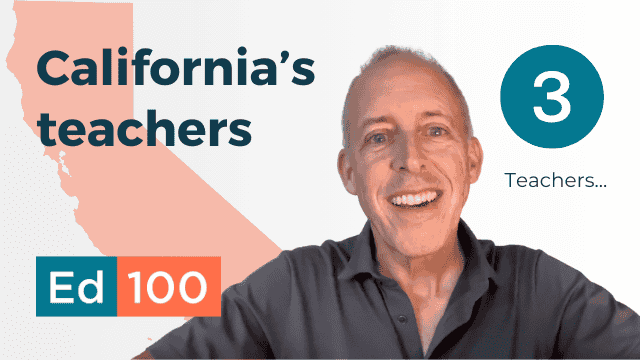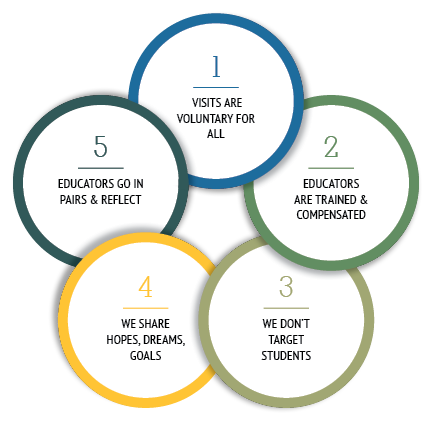
Students learn from teachers, so the most direct way to enhance learning is to improve teaching.
In This Lesson

What are the incentives for teachers to take more college classes?
Do advanced degrees make teachers better?
Why does it help for teachers to visit kids at home?
What are the standards for a good teacher?
What is professional development (PD)?
How do teachers improve?
▶ Watch the video summary
★ Discussion Guide.
To be effective, teachers need relevant knowledge and skills. For example, to teach math, you need to understand the subject well. But you also need communication skills, organizational skills, and relationship skills.
The education system has been built with well-intentioned incentives that are meant to help teachers improve, especially through higher education. These incentives waste enormous amounts of money and distract teachers from better uses of their time. This lesson explains how the incentives work, and suggests some approaches that might be better.
Teachers get extra pay for extra college credits
Most school districts pay teachers on the basis of a simple formula with two inputs: how many years have you worked in the district, and how many college credits have you earned beyond your undergraduate degree? Many districts offer a salary incentive for earning a masters degree without regard to the subject. (This system and alternatives to it will be explored in more depth in Ed100 Lesson 3.8, but for now this is enough.)
Teachers respond to these incentives. Most invest time and money to earn advanced degrees, often taking on additional debt to do so. In addition to increasing their pay (and ultimately their pension, which is partly based on their final salary) college courses can help teachers qualify for additional credentials that make them eligible to teach particular classes. About half of California’s teachers eventually earn a master’s degree.
This kind of incentive is very common in the US. A national review of teacher contracts showed that some version of a pay-for-degrees bump is nearly universal:
"88 percent of large districts (including the 100 largest districts in the country and the largest in each state) offer additional pay to teachers who hold master's degrees."
Do students benefit from additional teacher education?
In short, no. There is scant evidence that earning postgraduate credits or a master's degree makes teachers better at their job. The National Center for Teaching Quality summarized the research bluntly:
"The evidence is conclusive that master’s degrees do not make teachers more effective. In fact, the evidence strongly suggests that rewarding teachers for these degrees is an inefficient use of limited public resources."
Understandably, institutions of higher education really, really want to show that advanced degrees make a difference, so they keep studying the question… with the same findings If the billions spent on ongoing education for teachers make any difference at all to students, it’s not systemically obvious.
The exception: Educators who teach math and science probably improve with additional math and science education
There's an important exception. Several studies suggest that educators who teach math and science probably improve by taking math and science courses. That's about it.
Why does the system spend for degrees that don't benefit kids?
Responding to the evidence, some districts and charter schools have reconsidered their pay incentives for advanced degrees. Ed100 Lesson 3.8 will explore teacher pay systems and alternatives, and explain why they are very hard to change.
But let's return to the central question of this lesson: how do teachers improve? If taking more college classes isn't an effective way to help teachers improve in the classroom, what other strategies can school systems try?
Standards for Teachers
California developed the California Standards for the Teaching Profession to provide a common definition of what quality teaching looks like, in the hope of providing some guidance. The standards cover six areas of teaching quality:
Quality Teaching |
|---|
Engaging and Supporting All Students in Learning |
Creating and Maintaining Effective Environments for Student Learning |
Understanding and Organizing Subject Matter for Student Learning |
Planning Instruction and Designing Learning Experiences for All Students |
Assessing Students for Learning |
Developing as a Professional Educator |
Some principals and teacher leaders use these standards as guidance.
What is professional development?
To help teachers improve in their work together, many school districts invest in training for teachers. It's usually not called "training" — the jargon term professional development (or PD, pronounced pee-dee) is more popular, perhaps to incorporate the idea that improvement can be collaborative.
Professional development programs for teachers can be mandatory or voluntary, free or paid. Mandatory training generally falls within the scope of the teacher contract.At their best, professional development programs prepare teachers to address the challenges of their work. At their worst, they distract from that work.
Occasionally, professional development programs are funded and rolled out as a way to influence or accelerate change in the classroom. For example, in 2023 many districts in California invested in professional development programs to help teachers embrace phonics to ensure that all students learn to read.
Learning to engage students
Technology has changed the way that busy people learn. This includes teachers who want to upgrade their classroom skills and engage more successfully with students. An inconspicuously-perched camera has become a major tool for self-critique and peer review. Doug Lemov, author of the book Teach Like a Champion and others, has helped many teachers build their skills. His videos of uncommonly effective teachers have become critical training for many educators.
Investing in empathy

Teachers aren't rich, but they generally live more comfortably than their students. Especially in high-poverty schools, it can be hard for teachers to understand the home and family conditions that kids return to when school lets out. Misunderstandings can go both ways: it can be hard for parents to believe that teachers understand or care about their kids' life beyond the classroom.
The pandemic temporarily and accidentally made these differences a little easier to see. In the background of video conferences with the camera on, teachers and students glimpsed one another's homes and family members. Sometimes these glimpses became teachable moments, or the basis for conversations.
Even before the pandemic, some school districts invested in parent-teacher home visits, enabling teachers to visit students' homes and meet their families. The program, which has been around for decades, is well-defined, easy to try out, and rarely sparks opposition. Home visits are voluntary for both parents and teachers, and teachers are compensated for their time. The program is popular with teachers and families, and seems to produce lasting results. It is especially potent as a way to improve attendance. (For more, see the Ed100 blog post on this topic.)
This seems a reasonable moment to re-emphasize a recurring theme: there's no magic here. Public education is complicated, personal, human work, conducted at enormous scale. It is not easy.
If formal training generally falls short, how do most teachers learn their craft? The next lesson examines the subject of teacher collaboration.
Last updated October 2023
Quiz×
CHAPTER 3:
Teachers
-
Teachers
Overview of Chapter 3 -
Teacher Recruitment
Who Teaches, and Why? -
Teacher Certification
How Are Teachers Prepared? -
Teacher Retention
How to Keep a Teacher -
Teacher Placement
Who Teaches Where? -
Teacher Development
How Do Teachers Improve? -
Teacher Collaboration
How do Educators Work Together? -
Teacher Benefits
Healthcare and Sick Days -
Teacher Pay
How much are teachers paid? -
Teacher Evaluation
How Do Teachers Know If They Are Succeeding? -
Tenure and Seniority
Teacher Tenure - Good? Evil? -
Pensions
How Good is a Teacher's Pension?
Related
-
Teacher Collaboration
How do Educators Work Together? -
Teacher Evaluation
How Do Teachers Know If They Are Succeeding? -
Tenure and Seniority
Teacher Tenure - Good? Evil? -
Time Management in School
Spending Time Well -
Principals and Superintendents
The Pivotal Role of an Educational Leader -
Technology in Education
Tools for Teaching and Learning
Sharing is caring!
Password Reset
Search all lesson and blog content here.
Login with Email
We will send your Login Link to your email
address. Click on the link and you will be
logged into Ed100. No more passwords to
remember!















Questions & Comments
To comment or reply, please sign in .
Carol Kocivar August 3, 2022 at 8:38 pm
• Teacher Examination Fees
• Integrated Teacher Preparation Programs
• Commission on Teacher Credentialing (CTC) Support
• Career Counselors
• Substitute Teaching Assignments
Jeff Camp - Founder February 1, 2022 at 8:10 pm
improvement in teacher performance early in the career and suggestive evidence of continued growth through at least the first ten years on the job. The magnitude of these gains is large, eight tenths of a standard deviation after ten years..."
Sheila Melo May 29, 2020 at 10:54 am
Susannah Baxendale January 14, 2019 at 11:04 am
Caryn January 15, 2019 at 10:42 am
owenbscott December 1, 2018 at 6:21 pm
Jeff Camp - Founder May 26, 2017 at 2:51 pm
Jeff Camp October 23, 2021 at 10:01 am
Carol Kocivar June 10, 2016 at 3:47 pm
A new study from the Learning Policy Institute finds that teachers improve performance with experience. The report offers program and investment strategies to attract, retain, and develop talented teachers who have opportunities to learn and grow throughout their careers.
Read the full report: https://learningpolicyinstitute.org/our-work/publications-resources/does-teaching-experience-increase-teacher-effectiveness-review-research
Carol Kocivar January 29, 2016 at 3:04 pm
This report looks at how Shanghai, British Columbia, Singapore, and Hong Kong provide professional learning to their teachers.
http://www.ncee.org/beyondpd/
Click the link for Key Findings: http://www.ncee.org/wp-content/uploads/2015/08/PLEventBeyondPDTakeaways-FINAL.pdf
maritess July 13, 2015 at 4:44 pm
http://edsource.org/2015/state-to-spend-a-half-billion-dollars-to-promote-teacher-effectiveness/81689
It will be interesting to see how districts choose to spend these additional funds. I hope they don't just throw one-time training classes at teachers, but find ways to invest in systems/processes that yield longer term benefits.
jenzteam February 27, 2015 at 1:37 pm
Jeff Camp - Founder February 27, 2015 at 3:57 pm
CM January 19, 2015 at 2:53 pm